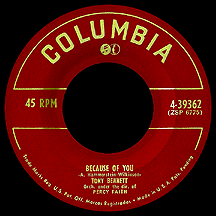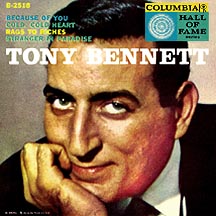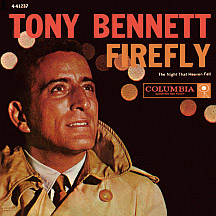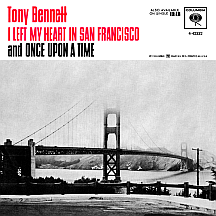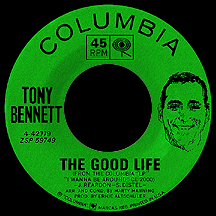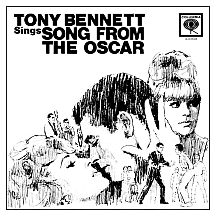TONY BENNETT
"Because of You," a song written by Arthur Hammerstein (son of the great Oscar H.) and Dudley Wilkinson, had been around a decade before Tony Bennett recorded it in 1951. Its inclusion in the fairly obscure film I Was An American Spy, released just before Tony's single, seems to have had little relation to the song's towering success; it became a number one hit spanning more than two months between August and October. Bennett's transition from little known warbler to household name appeared to happen overnight, though he had been working towards this goal for several years.
Growing up the son of a grocer in Queens, New York, Antonio Benedetto revealed two skills as a youngster: he loved to draw and often made caricatures of classmates in school....and he loved to sing. The traditional Italian songs of his childhood were supplemented with the popular music of the day as his teens progressed; pop singers like Al Jolson and Bing Crosby drew his interest, as did the music of jazz greats like Duke Ellington and Louis Armstrong. He studied music and painting at the High School of Industrial Arts in New York, but dropped out at age 16, just about the time the U.S. was entering World War II. He worked a number of jobs, the best of them as a singing waiter at one or two local Italian restaurants. Joining the U.S. Army in 1944, he fought in Europe during World War II and had some harrowing experiences; the significant musical presence he's displayed in the seven decades since could easily have been left unrealized on the battlefield.
Returning to New York after the war, he resumed singing at restaurants and gained employment in nightclubs, often using the name Joe Bari. In 1949 he made his first recording for the local Leslie label under that name; George and Ira Gershwin's "Fascinating Rhythm" was backed with an Italian song, "Vieni Qui," sung in a duet with relatively unknown singer Pat Easton. The record never got off the ground and today is extremely rare, with perhaps only one copy in existence. In 1948 he performed as a contestant on the CBS radio series Arthur Godfrey's Talent Scouts (Rosemary Clooney took top honors on the same broadcast) and was spotted by Bob Hope at a Greenwich Village night spot where he was opening for Pearl Bailey. Hope convinced him that Tony Bennett, a variation on his given name, was preferable to the Bari moniker; he also helped bring him to the attention of Mitch Miller at Columbia Records.
Despite a similarity to the style of Frank Sinatra, who'd been one of Columbia's top-selling artists for several years, Miller was impressed but urged Bennett to work on developing a different sound. "The Boulevard of Broken Dreams," an Al Dubin-Harry Warren song performed by actress Constance Bennett (no relation to Tony) in the 1934 film Moulin Rouge, was his first release in the spring of 1950; though it wasn't a hit, it became a favorite of Tony's fans in later years. He began patterning his singing style after two Mercury Records artists, Frankie Laine (who had a vocal quality he admired) and Dinah Washington (for her unique approach to phrasing).
Several 78s were released over the next year without catching on, though the work showed indication of his own emerging style. He came very close to being dropped by Columbia in 1951 when "Because of You," featuring orchestration by Percy Faith (as many of his early recordings did), made the biggest possible splash. A follow-up quickly appeared: "Cold, Cold Heart," a huge C&W hit for Hank Williams a few months earlier, again sent Tony to number one (knocking off "Because") and was the first of many Williams songs to reach a sizeable mainstream audience. In showing his appreciation for the increased exposure, and added royalties, Hank called Tony and jokingly asked, "What's the idea of ruining my song?"
"Blue Velvet," composed by Bernie Wayne and Lee Morris, came next; more closely associated with the 1955 recording by The Clovers and 1963 chart-topper by Bobby Vinton, it was Bennett's lushly-arranged rendition that first hit the charts. Throughout his career, Tony has insisted that he's only interested in performing great songs, regardless of origination. This approach has resulted in career lulls, as the quality of music remained high but didn't always connect with the public. His unprecedented success in 1951 led to an unforeseen struggle in 1952, his best effort that year being "Here in My Heart," which was seriously upstaged by Al Martino's chart-topping version (a breakthrough for the singer, paralleling Bennett's "Because of You" of the previous year).
By the middle of 1953 the question might have been "Is this it?" but the answer became "Not by a longshot!" "Rags to Riches," penned by Broadway songwriters Richard Adler and Jerry Ross, was released in late summer despite Tony's reservations. It was number one by mid-November, proving gut feelings aren't always correct; the hit single stayed on top for the remainder of the year. A rousing, uptempo plea, it showed a different side to the artist and revitalized his career, a process that would have to be repeated a few more times over the years. "Stranger in Paradise" came next, a showstopper from the Broadway musical Kismet. This time he had to deal with heavy competition from a version by The Four Aces (and, to a lesser degree, Tony Martin); what could have been another chart-topper was instead a top five hit in early 1954 for Bennett as well as Philadelphia's Aces. The show tunes were an irresistible hook to Tony, a connection to his New York roots, and he put his signature stamp on many of them in the coming years.
After two more popular hits in '54, Williams' "There'll Be No Teardrops Tonight" and the Lincoln Chase tune "Cinnamon Sinner," his acceptance by the masses hit an impasse greater than the more modest slump of a couple of years earlier. Between October '54 and March '56, one song after another met with the cold shoulder treatment from radio and record buyers. Mitch Miller commented about such times, noting Bennett's professionalism and ability to attract capacity crowds to his live shows in the best of times as well as "between hits." "Can You Find it in Your Heart" put him back on the charts in the spring of 1956, but the top ten proved elusive for the near future. Still, a surge of popular performances hit the charts in '56 and '57, including "Happiness Street," "Just in Time" (from Broadway's Bells Are Ringing) and a rousing live performance of Johnny Mercer and Harold Arlen's 14-year-old creative gem "One For My Baby (And One More For the Road)."
In the meantime he increased his television exposure with The Tony Bennett Show, a five-week summer '56 replacement for Perry Como's top-rated NBC show (he returned for another go-round in 1959, co-hosting with Teresa Brewer under the title Perry Presents). Varying from his usual formula, Bennett then recorded "In the Middle of An Island," a Hawaiianesque tune written by Ted Varnick and Anthony Acquaviva (Joni James' husband), perhaps more suited to an artist like Columbia's Marty Robbins (who had an affinity for Pacific Island material). This sharp musical turn for Tony worked in his favor, landing him in the top ten for the first time in more than three years.
Ralph Sharon became Bennett's musical director and pianist in 1957, replacing Chuck Wayne. His hiring was a turning point in Tony's career; the musically sharp-witted Sharon leaned toward jazz and suggested it would be in the singer's best interest to explore this territory more deeply; afterwards Bennett's music, particularly on stage, became more experimental while reflecting a gradual shift away from the current pop trends of any given moment, though the singles released by Columbia stayed with what, for the most part, had worked. His biggest hit from the final two years of the decade was "Firefly," a cheerful, bouncy arrangement of a Carolyn Leigh-Cy Coleman song that put him in the top 20, the last time he would reach that level for five years.
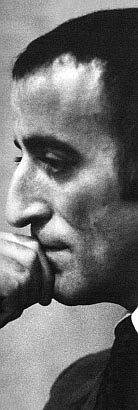
Tony's interpretations of "Smile" (a two-decade-old standard penned by Charlie Chaplin) and "Climb Ev'ry Mountain" (an inspirational moment from the Broadway production of The Sound of Music) made some impact in '59, after which he worked live dates and released records while largely staying under the radar, a frustrating situation at best. To many it seemed that Tony had simply vanished between 1959 and '62; when the comeback happened it rolled in as quickly as a single day's morning fog. His moving performance of "I Left My Heart in San Francisco" was a breakthrough for songwriters Douglass Cross and George Cory, debuting on the charts in August 1962. The song's lyrics vividly conjured an image '...above the blue and windy sea...' and described a place '...where little cable cars climb halfway to the stars...' and it caught listeners in just the right way at the right time. It reached the top 20 in October '62, while the album of the same title sold beyond any previous Bennett disc, staying on the charts nearly three years and going well over the million mark. At the May 1963 Grammy Awards ceremony, Tony walked away with trophies for Record of the Year and Best Solo Vocal Performance, Male.
He was back, and there would be no stopping him for several years. "I Wanna Be Around" was another big hit, created after an Ohio housewife named Sadie Vimmerstedt wrote a fan letter to Johnny Mercer suggesting some lyrics she had come up with: "I wanna be around to pick up the pieces...when somebody breaks your heart' inspired Mercer to finish the song. He gave her a writers' credit and 50 percent of the royalties. Tony's creative association with Ralph Sharon reached its peak during the next few years with songs like "The Good Life" (composed by Jack Reardon and French singer-songwriter Sacha Distel), another top 20 hit in '63, "When Joanna Loved Me," a 1964 recording of a Robert Wells-Jack Segal composition (he later named his daughter Joanna after the song), followed by "A Taste of Honey," considered by some the definitive version of the tune written by Bobby Scott and Ric Marlow.
He scored with material from stage and film in '64 and '65: "Who Can I Turn To" (from Broadway's The Roar of the Greasepaint), "If I Ruled the World" (from the Broadway play Pickwick) and, from the film The Sandpiper, "The Shadow of Your Smile" (an Academy Award winner for Best Song). He had given acting a shot with a few 1963 episodes of 77 Sunset Strip; in 1966 he again left his comfort zone by taking a role in The Oscar, a notoriously bad film co-starring Stephen Boyd and Elke Sommer. To say it didn't go well is an understatement; critics lambasted the film, singling out Tony's lack of acting chops in sharp contrast to his superior singing ability. The experience soured Bennett on making movies and he voluntarily bowed out of the film industry.
He and Sharon parted ways at about this time and his record sales took the inevitable plunge in the late '60s as the tastes of the record buying public changed with the rise of harder rock, soul and other youth-oriented musical trends. His best-known recording from this period, perhaps, was "For Once in My Life" in the fall of 1967, notable not for his version but because it became a major hit for Stevie Wonder a year later. By 1972 Columbia Records was through with him (or so they thought). He recorded for Verve, but soon after had no record deal as his life, so dependent on his art, spiraled downward. This worst period of his career lasted about a decade, but in the mid-1980s he reunited with Ralph Sharon, resigned with Columbia and mounted a comeback, leading to some of the best selling records of his career, a stack of awards that continues growing and the realization of another dream: creating oil paintings that have appeared in art galleries and are in hot demand among collectors. Nowadays, so far as the realm of music and art goes, Tony Bennett no longer has to ask what it would be like "If I Ruled the World." The answer is obvious.
NOTABLE SINGLES:
- The Boulevard of Broken Dreams - 1950
- Because of You /
I Won't Cry Anymore - 1951 - Cold, Cold Heart - 1951
- Blue Velvet /
Solitaire - 1951 - Here in My Heart - 1952
- Have a Good Time - 1952
- Rags to Riches - 1953
- Stranger in Paradise - 1954
- There'll Be No Teardrops Tonight - 1954
- Cinnamon Sinner - 1954
- Can You Find it in Your Heart - 1956
- From the Candy Store on the Corner to the Chapel on the Hill /
Happiness Street - 1956 - The Autumn Waltz /
Just in Time - 1956 - One For My Baby (And One More For the Road) - 1957
- In the Middle of an Island /
I Am - 1957 - Ca, C'est L'Amour - 1957
- Young and Warm and Wonderful - 1958
- Firefly - 1958
- Smile - 1959
- Climb Ev'ry Mountain - 1959
- I Left My Heart in San Francisco /
Once Upon a Time - 1962 - I Wanna Be Around /
I Will Live My Life For You - 1963 - The Good Life /
Spring in Manhattan - 1963 - This is All I Ask /
True Blue Lou - 1963 - Don't Wait Too Long - 1963
- The Little Boy - 1964
- When Joanna Loved Me - 1964
- A Taste of Honey - 1964
- Who Can I Turn To - 1964
- If I Ruled the World - 1965
- Fly Me to the Moon - 1965
- The Shadow of Your Smile - 1965
- Song from The Oscar - 1966
- Georgia Rose - 1966
- A Time For Love - 1966
- What Makes it Happen - 1967
- For Once in My Life - 1967
- Yesterday I Heard the Rain - 1968


